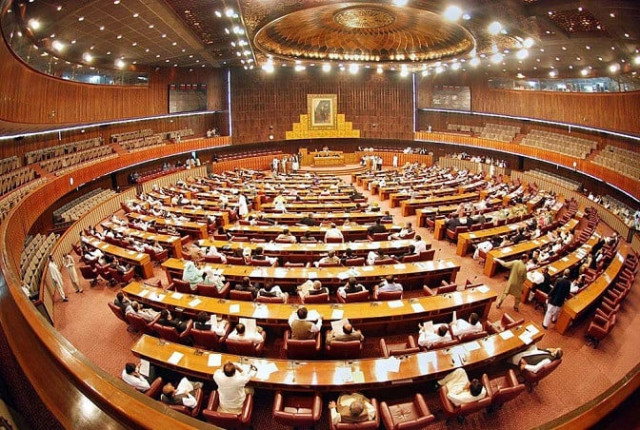Opp rolls up sleeves as NA takes up mini-budget
Bill likely to spark fireworks as both sides of the aisle prepare for fight

The government is all set to convene the National Assembly session on Monday (today) to present amendments relating to taxes and duties as the Finance (Supplementary) Bill, 2021, generally known as mini-budget. The approval of the finance bill is necessary to ensure Pakistan’s sixth review of the $6 billion Extended Fund Facility gets cleared by the IMF’s Executive Board which is scheduled to meet on January 12 to decide the disbursement of about $1bn tranche.
Days after Finance Minister Shaukat Tarin introduced two bills in the assembly to give effect to the Rs375 billion mini-budget and grant autonomy to the central bank, NA’s agenda issued on Sunday shows that he would move the bill to amend certain laws pertaining to taxes and duties in Monday's session. The placement of the government’s proposals is expected to trigger fireworks in the lower house as the joint opposition, which has denounced the finance bill as akin to “surrendering” to the IMF, is pulling up its sleeves and is scheduled to meet before the session at the parliament house.
On December 30, 2021, Finance Minister Shaukat Tarin introduced the Finance mini-budget in the National Assembly amid a vociferous protest by the opposition lawmakers.
The State Bank of Pakistan (SBP) Amendment Bill 2021 was also presented in the House, which was referred to the relevant standing committee for vetting. As the proceedings started, despite the absence of PML-N President Shehbaz Sharif and PPP chairman Bilawal Bhutto, opposition leaders accused the government of “auctioning off” Pakistan's sovereignty to IMF and burdening the nation by withdrawing tax exemptions by introducing the bills.
READ Govt ready to talk with Opposition on major issues, says Fawad
Nonetheless, the treasury benches remained unfazed and moved on with the agenda items.
Besides, it had become clear at the outset that the opposition's efforts to counter the proposals were hobbled by the absence of its key leaders as it had already failed to meet the required majority to oppose bills. In the last session, Tarin had proposed amendments in income tax, sales tax and federal excise laws to impose Rs375 billion taxation measures amid strong protest by the opposition parties.
Reportedly, the introduction of both the bills in NA marks the first serious step towards meeting the IMF’s conditions for approval of both pieces of legislation.
Out of Rs375 billion, it was reported, the Rs343 billion worth of sales tax exemptions are proposed to be withdrawn. In addition, the Rs7 billion income tax measures have been taken in the shape of increasing the income tax rate on telephone calls by 50% and enhancing advance income tax on registration of cars by 100%. Article 73 of the Constitution deals with the “procedure with respect to money bills”, which are only required to be passed by the National Assembly, the lower house of parliament.
However, Article 73(1) states: “Notwithstanding anything contained in Article 70, a money bill shall originate in the National Assembly: provided that simultaneously when a money bill, including the finance bill containing the annual budget statement, is presented in the National Assembly, a copy thereof shall be transmitted to the Senate which may, within fourteen days, make recommendations thereon to the National Assembly.”
These recommendations, however, are not binding for the National Assembly and it can approve a money bill, even without considering it. Federal Minister for Information and Broadcasting Chaudhry Fawad Hussain said on Friday that the government would comfortably meet prior conditions set by the Fund and pass the upcoming mini-budget and a bill dealing with the central bank’s autonomy before the deadline.
Earlier, the federal information minister had said that the government would fulfil the IMF’s conditions, including the passing of mini-budget and the SBP amendment bill when the country’s sixth review will be presented to the IMF Board for the next loan tranche of $1 billion.



















COMMENTS
Comments are moderated and generally will be posted if they are on-topic and not abusive.
For more information, please see our Comments FAQ